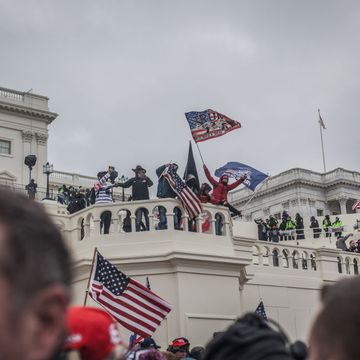Update: A correction. This post and our story "The Shooter" misstated the extent of the five-year health care benefits offered to veterans of the wars in Iraq and Afghanistan. The Department of Veterans Affairs offers comprehensive health care to eligible veterans through VA facilities during that period, but it does not offer coverage to their families. The Shooter must purchase private health care for his wife and children.
Editor's Note: The online version of The Shooter story did not reflect the final version of the story in the print magazine, which went to press 10 days ago. The print version included more details about the availability of benefits for veterans. Unfortunately, this omission on the online version, which has been corrected, has led to a misunderstanding, through no fault of her own, by reporter Megan McCloskey and others about some of the facts in our story regarding healthcare and our veterans. The online version of the piece omitted the following paragraph that appears in the print magazine: "There is also a program at MacDill Air Force Base designed to help Special Ops vets navigate various bureaucracies. And the VA does offer five years of benefits for specific service-related claims—but it's not comprehensive and it offers nothing for the Shooter's family." The story's argument, however, remains the same: That the man who shot and killed Osama bin Laden, as the following post explains, remains responsible for his own healthcare and that of his family.
After yesterday's release of "The Shooter", Esquire's 15,000 word piece by Phil Bronstein on the Navy SEAL who killed Osama bin Laden and his difficult transition back to civilian life, much attention is being correctly focused on the surprising straits that even the most highly-trained and elite soldiers face after often harrowing service to the United States.
Bronstein's piece goes into great detail about the SEAL's (identified only as "the Shooter") service during his sixteen years in - hundreds of combat missions, twelve extended deployments, thirty-plus kills - and the piece argues that ultimately, because of the services rendered to the country and the sacrifices demanded of them, the Tier One special operators such as the Shooter and his colleagues should be considered and treated separate and apart from all other veterans once they come home. Bronstein: "The American way of war has changed radically in the past decade, so that in the future, "boots on the ground" will more and more mean special operators. Which means that there will be increasing numbers of vets in the Shooter's circumstance: abandoned, with limited choices."
In response to "The Shooter", a reporter for Stars & Stripes, Megan McCloskey, wrote a story which focused on this passage in Bronstein's piece:
"But the Shooter will discover soon enough that when he leaves after sixteen years in the Navy, his body filled with scar tissue, arthritis, tendonitis, eye damage, and blown disks, here is what he gets from his employer and a grateful nation: Nothing. No pension, no health care, and no protection for himself or his family."
McCloskey's story is entitled, "Esquire article wrongly claims SEAL who killed bin Laden is denied healthcare" and it is that headline that contains her first factual error, for nowhere in Bronstein's piece does he write that the Shooter was "denied" healthcare. Rather, what Bronstein's piece properly establishes is that once the Shooter and his colleagues separate from the service, they must go into the private market to buy insurance to match the coverage for themselves and their families that they had when they worked for the government, and that this transition is an abrupt one. There are benefits available to combat veterans via the VA, which "The Shooter" discusses (this constitutes the second factual error in McCloskey's piece, more on that in a moment), so what does Bronstein mean when he writes, "Nothing. No pension, no health care, and no protection for himself or his family..."? Well, he means precisely that. Because while the Shooter may be eligible for some direct benefits from the VA, his wife and two children are eligible for nothing. Not to get too deeply into the philosophy of insurance and the distribution of risk, but that means that under the best scenario, the Shooter is 1/4 covered, which of course means that he is not covered at all. It would be like having a 1/4 roof during a storm. Your house still fills with water. What good does it do the man if he can go to a government chiropractor for his neck when (heaven forbid) his child could get sick and wipe out the family? It is a simple fact that when your family doesn't have healthcare, you don't have healthcare. Think the Shooter has healthcare? We respectfully suggest that Ms. McCloskey ask his wife.
Which brings us back to McCloskey's second mistake. In the Stars & Stripes piece, she further writes:
"Like every combat veteran of the Iraq and Afghanistan wars, the former SEAL...is automatically eligible for five years of free healthcare through the Department of Veterans Affairs. But the story doesn't mention that."
Now McCloskey is wrong here (through no fault of her own as we noted above). We refer her to this paragraph deeper in the piece: "There is a Transition Assistance Program in the military, but it's largely remedial level, rote advice of marginal value: Wear a tie to interviews, not your Corfam (black shiny service) shoes. Try not to sneeze in anyone's coffee. There is also a program at MacDill Air Force Base designed to help Special Ops vets navigate various bureaucracies. And the VA does offer five years of benefits for specific service-related claims—but it's not comprehensive and it offers nothing for the Shooter's family."
And as for her use of the word "automatically", well, that is problematic, too, as there is nothing automatic about benefits from the VA. Sources from the VA tell us that only 40% of eligible veterans use the benefits, because, as was the case with the Shooter, they aren't aware the benefits exist. The same VA source lamented this fact and wondered why veterans aren't automatically enrolled, saying that "it would be a nice service for soldiers….if benefits were explained." As for the VA benefit itself, it is fairly liberal where it sets the "service-related claims" bar, but there are vagaries about what is covered and what isn't, what requires payment and what doesn't, illnesses versus accidents, etc. The same VA source said that for instance, "if a veteran had other insurance and [the claim] was non-service connected,the VA would not cover it. There are also a bunch of other stipulations that come into play that affect our ability to pay or not pay." And in the magazine's reporting on the subject, one thing has become clear - many veterans, veteran advocates, and VA officials we spoke with did not display a well-informed grasp of the benefit.
And all of this is not even to mention the fact that should the Shooter, or any veteran, wish to make a disability claim to the VA, he'll be out of luck for the on-average nine months that it will take for the paperwork to go through.
So if there are people out there, journalists included, who think that the status quo is hunky dory, the government's approach to these extraordinary veterans is just right or even adequate, and who are too quick to incorrectly call another journalist's work "wrong" rather than doing their own work on the profound problems of returning veterans, then, as the cover of the magazine says, the man who killed Osama bin Laden truly is screwed.












